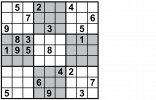Someone has bent the rules.
You'll have to justify that assertion. Show me where the rules say anything about valid or invalid solving logic.
Normally you'd apply some sort of logic to find the solution
saying "please make it easy so my limited abilities can solve it without guesswork" doesn't make the hard ones not Sudokus
To expand on that: what do you mean by "logic"? I'll agree to disagree on the exact categorisation:
Level 0: Eight of the squares (in a row, column, or box) are already filled, so the ninth is the last remaining digit.
Level 1: The intersecting row, column, and box containing any particular empty square contain eight different digits, so the square must contain the last remaining digit.
Level 2: All the squares that a particular digit could be placed in any row, column, or box are already occupied except one.
Level 3: All the squares that a particular digit could be placed in any particular row, column, or box also contain a complete set of other candidate digits (by which I mean there are only n digits to fill n squares) except one (AKA "Naked Doubles/Triples/etc").
Level 4: All the squares that a particular digit could be placed in any particular row, column, or box also contain a complete set of other candidate digits (by which I mean there are only n digits to fill n squares) by virtue of exclusion, except one (AKA "Hidden Doubles/Triples/etc").
After that, you get into Swordfish, X-Wing, XY Chain etc etc (there are loads of strategies, most of which I can't get my head around let alone spot them in a grid)... but every single one of these strategies is actually a way to short-cut a trial and error exercise by predicting what will lead to a contradiction without going to all the effort of trying it. Yes, it's the result of logic, but nothing in the universe says there are not more tricks so far undiscovered.
So, according to you, any particular Sudoku set-up is only valid if: (a) there is just one solution (I'll accept that); and (b) it is amenable to solution using currently known strategies not including brute force (ie trial and error).
But, according to me, just because anyone's IQ is insufficient to find a solving strategy other than brute force, doesn't mean there isn't one, and it seems arrogant to declare there isn't one and that the particular Sudoku is therefore somehow "unfair". It's whinging.




